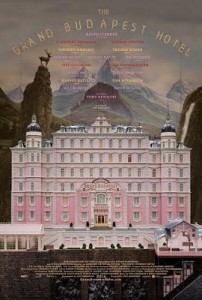film review: the grand budapest hotel
Inspired by the writings of Stefan Zweig, Wes Anderson’s The Grand Budapest Hotel is truly a feat of grandeur.
Set in the fictional Zubrowka, somewhere amongst candy-coloured Middle Europe, the story follows Zero Moustafa (F. Murray Abraham and Tony Revolori in youth), a lobby boy at the renowned Grand Budapest Hotel, and his relationship with the hotel’s fabled concierge, M. Gustave (Ralph Fiennes).
An eccentric and somewhat contemptuous warden, Gustave evolves as a mentor for young Zero as they run the hotel sometime between the great wars of the early 20th century. Here, Zero learns of Gustave’s relations with several of the hotel’s patrons, all as blond, superficial and insecure as he. Young Zero also learns of Madame D. (Tilda Swinton), an 84-year-old countess who shares an exceptional bond with the droll concierge. Following her sudden passing, commotion surmounts when her family learn of their peculiar relationship through her inclusion of Gustave in her will.
Outraged at a lack of inheritance, her ungrateful son, Dmitri (Adrien Brody), is furious that the heirloom painting Boy With Apple would be left to the formerly-unknown concierge. This leads to Gustave and Zero’s ploys to steal the painting and retrieve what’s rightfully theirs.
Anderson has managed, quite astoundingly, to produce such intricacy within 100 minutes that the film, in all its pastiche glory, is guaranteed to titillate newcomers and satisfy Anderson regulars. That is not to say The Grand Budapest Hotel is a rehashed and tiresome effort, but rather formulaic and entirely his.
The film features every Andersonism we’ve come to know and love, from double-take shots that focus on character action and speech, tracking shots and colour-coordinated settings of pastel tones, and the beloved titles, with the familiar Futura bold font printed atop. One could virtually play Wes Anderson bingo with this achievement.
As the story jumps between historical periods through Zero’s recollections, the auteur reveals his signature flourishes. Each period bears its own miscellany of design, from the variants of pigmentation in set and costume, right down to the aspect ratio. Dependent on historical context, it is switched as flashbacks dictate.
But such intricacy proves unsatisfactory for Anderson, with his meticulousness tracing further to minute stylization, as single, perfect streams of blood trickle down characters’ nostrils when conflict ensues.
This is not to say that style prevails over narrative. The story is dense and one which certainly makes up for that which lacked in Anderson’s recent endeavors, namely 2012’s Moonrise Kingdom (a visual delight that was spectacular insofar as its weak storyline could take it). The Grand Budapest Hotel‘s dialogue is sharp and this is reflected in its rapidly-paced narrative.
As the story unfolds, so too does Anderson’s capacity to showcase his ability to balance narrative with comedy. We see an expected return of Anderson’s traditional humor through deadpan delivery and familiar pretention – a fundamental character trait in the Wes Anderson universe.
The humour is further enhanced by the film’s theatricality. Movements feel timed with precision as characters exchange quick glances of suspicion and paranoia or take synchronized steps in moments of calculating tension. A notable mention goes to the super-unrealistic jailbreak scene, in which Gustave and co. tiptoe over cellmates’ bed posts in the middle of the night, wielding a ladder that seems never ending in length.
Amongst the vibrancy, there is an underlying sadness. The longing that Zero feels throughout the recount of his relationship with Gustave is made apparent as the story progresses, and reinforced through aesthetic appeal. Zero’s reminiscence is expressed prominently through set design and the nostalgia that surrounds each detail. From the gold-trimmed balconies of the Grand Budapest’s baby pink exterior to the thin pencil mustache that young Zero draws above his top lip each morning, the film’s link between visuals and emotion allows the sentiment to remain most prominent throughout and even post-viewing.
Anderson is truly a great director. Each of his projects proves another opportunity to better himself, refine his trade and conjure the most poignantly tragic pieces possible, and The Grand Budapest Hotel is the high point of his career so far.



Pingback: The Grand Budapest Hotel – film review | anthologc
Re. the first sentence – it’s actually Stefan Zweig, not Steven Zweig.
Thanks for the heads up, Cat!